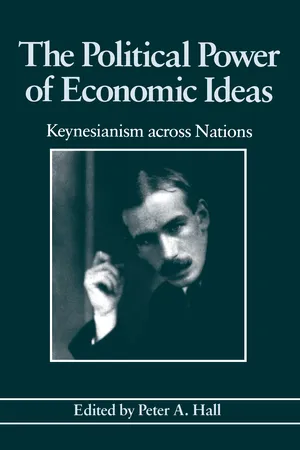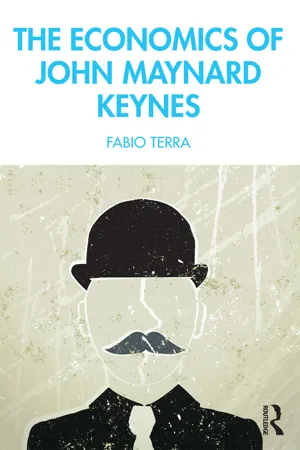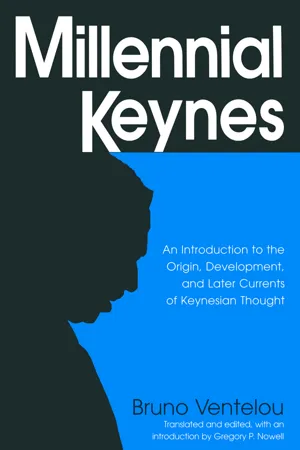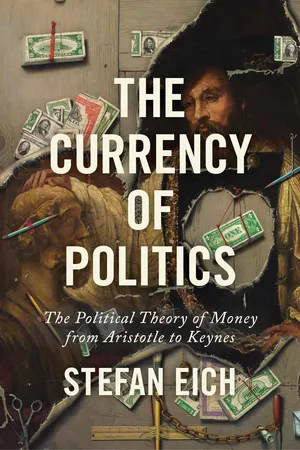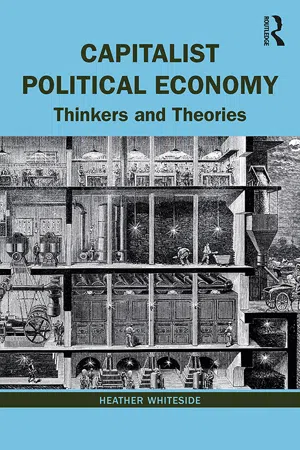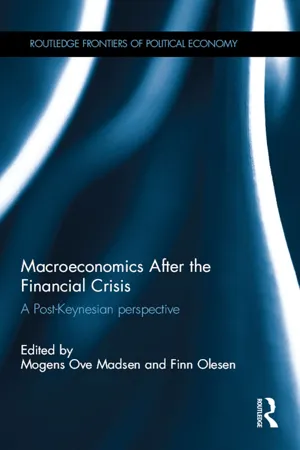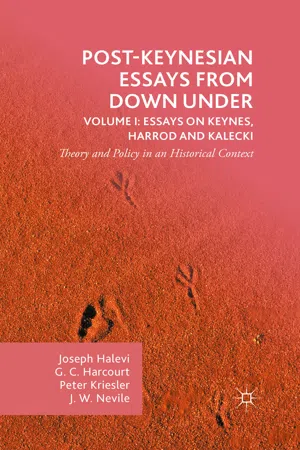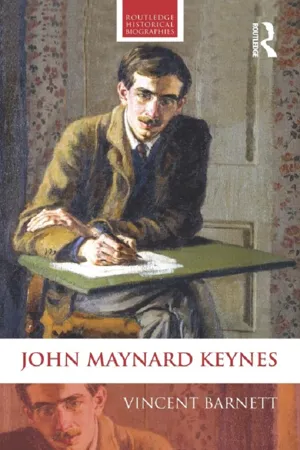Politics & International Relations
John Maynard Keynes
John Maynard Keynes was a British economist whose ideas revolutionized economic theory and policy. He is best known for his advocacy of government intervention in the economy to mitigate the effects of economic recessions and depressions. Keynesian economics, which emphasizes the role of aggregate demand in driving economic activity, has had a profound impact on economic policymaking worldwide.
Written by Perlego with AI-assistance
Related key terms
Related key terms
1 of 4
Related key terms
1 of 3
8 Key excerpts on "John Maynard Keynes"
- eBook - ePub
The Political Power of Economic Ideas
Keynesianism across Nations
- Peter A. Hall(Author)
- 2020(Publication Date)
- Princeton University Press(Publisher)
This chapter uses the case of Keynesian ideas to address such questions. Its purpose is to develop a broad view of the factors that conditioned the progress of Keynesian ideas from theoretical expression to implementation as policy and to identify the historical elements that rendered Keynesianism more influential in some nations than others. The analysis proceeds in three stages. In the section that follows, I distinguish three dimensions of Keynesian thought: Keynes’ reformulation of fundamental economic concepts, his contribution to a new view of the activist state, and his specific proposals for countercyclical demand management. I argue that each dimension of Keynesian thought became influential in a different way. We can learn much from this case about the multiple roles that ideas play in the political world. Next, I present an overview of the considerations influencing policy makers’ judgments about Keynesian ideas. This overview is designed to summarize some of the most important points made in preceding chapters in this book. The policy makers’ response to Keynesian ideas seems to have been conditioned not only by the economic viability of those ideas, but by their administrative and political viability as well. Finally, I turn to the problem of explaining why Keynesian ideas about demand management acquired influence over policy in some national settings but not in others. Four kinds of factors seem to have affected the influence of Keynesian proposals: the orientation of the governing party, the structure of the state and state-society relations, the nature of national political discourse, and the events associated with World War II.THE INFLUENCE OF KEYNESIAN IDEAS
John Maynard Keynes was one of the most imaginative thinkers of our century. Even the ideas associated with The General Theory, on which this book focuses, were multifaceted; and, like many doctrines, his did not have to be accepted in toto to be accepted at all. Moreover, there were many dimensions to Keynesian thought and each became influential in a different way. At the risk of some oversimplification, we can say that there were at least three dimensions to Keynesian doctrine.7First, Keynes introduced a new set of concepts into macroeconomic analysis based on the balance between aggregate demand and supply. These were the ideas later integrated by John Hicks and others into what is usually termed the “neoclassical synthesis.”8 They ultimately revised the very terms through which economists saw the macroeconomy.Second, Keynes also provided a rationale for more active government management of the economy. Keynes broke with classical views of the polity and economy as separate spheres and with the related view that the market economy was fundamentally stable or likely to function best when free from state intervention. By arguing that private markets were inherently unstable but susceptible to correction through discretionary government action, Keynes provided a powerful justification for increased state intervention in the economy and contributed to a redefinition of the accepted boundaries between the public and private spheres in society. - eBook - ePub
- Fabio Terra(Author)
- 2023(Publication Date)
- Routledge(Publisher)
The Economic Consequences of the Peace. Summit: Start Publishing.- Keynes, J. M. (2013c).
A Treatise on Money II, the Applied Theory of Money: The Collected Writings of John Maynard Keynes, vol. VI. London: Cambridge University Press.- Keynes, J. M. (2013d).
The General Theory of Employment, Interest and Money: The Collected Writings of John Maynard Keynes, vol. VII. London: Royal Economic Society and Cambridge University Press.- Keynes, J. M. (2013e).
Essays in Persuasion: The Collected Writings of John Maynard Keynes, vol. IX. London: Royal Economic Society and Cambridge University Press.- Kregel, J. (1985). ‘Budget Deficits, Stabilisation Policy and Liquidity Preference: Keynes’s Post-War Policy Proposals’, in Vicarelli, F. (ed.)
Keynes’s Relevance Today. London: Macmillan, pp. 28–50.- Lerner, A. (1943). ‘Functional Finance and the Federal Debt’,
Social Research, 10(1), pp. 38–51.- Minsky, H. (1986).
Stabilizing an Unstable Economy. A Twentieth Century Fund Report. New Haven: Yale University Press.Passage contains an image
14 Monetary PolicyDOI: 10.4324/9781003287094-19Monetary policy is the State action that intervenes in the economy by means of money and finance. Central banks, such as the US Federal Reserve System, the UK Bank of England, and the Brazilian Central Bank, are the State entity responsible for handling monetary policy. Monetary management is a twofold task. On the one hand, it takes care of the national currency. On the other hand, it also uses money as a tool to accomplish effects on other economic variables, such as employment and growth.Keynes dedicated a lot of his attention to monetary policy in The General Theory - eBook - ePub
Millennial Keynes
The Origins, Development and Future of Keynesian Economics
- Bruno Ventelou, Gregory P. Nowell(Authors)
- 2015(Publication Date)
- Routledge(Publisher)
IntroductionKeynesian Economies and the American Polity
Gregory P. Nowell—Keynes, General TheoryThus our argument leads toward the conclusion that in contemporary conditions the growth of wealth, so far from being dependent on the abstinence of the rich, as is commonly supposed, is more likely to be impeded by it. One of the chief social justifications of great inequality of wealth is, therefore, removed.The motivating spirit of Keynesian economics depends on two core ideas: that social equity is the key to making capitalism sustainable, and that to achieve social equity there must be a national commitment to full employment and to income redistribution. The emphases on employment and redistribution are direct reflections of the crises of the pre-World War II era, but we do no violence to Keynes in adding, in our own time, environmental protection and quality of life to the goal of social equity.Keynes faced two sorts of international crises in his lifetime. The first was the collapse of the European economy after World War I.1 Keynes argued passionately that excessive debt burdens in the wake of this war— not just the reparations imposed on Germany but debts contracted by all the nations of Europe—would crush their collective economies. His call for a “general bonfire” (Economic Consequences of the Peace , 281) of debt was an appeal to free Europe’s laborers and capitalists from the catastrophic misjudgments of their governments. He darkly warned of tyrannies and communist experiments that would otherwise emerge, and in the event he was largely proved right.At the same time, Keynes’s other chief recommendation, that trade liberalization in Europe would encourage economic recovery, anticipated contemporary policies. The United States and the International Monetary Fund invariably respond to economic crises by pushing for more trade liberalization. The thrust of Keynes’s early arguments was that, absent vindictive reparations policies and punitive trade restrictions on Germany, the natural force of capitalism would lead Europe toward recovery from the crisis of the war. - eBook - ePub
The Currency of Politics
The Political Theory of Money from Aristotle to Keynes
- Stefan Eich(Author)
- 2022(Publication Date)
- Princeton University Press(Publisher)
137 Democratic politics could produce surprising results in the realm of money.For Keynes, by contrast, the end of gold was the leap into the future he had longed for. The appropriate response to the end of gold hinged on his larger vision of a new liberalism that would no longer define itself simply as the guardian of laissez-faire but advance a broader conception of human flourishing. And as he had insisted for years, any such attempt to formulate a new liberal response to economic questions in turn required a fundamental rethinking of the international system. After all, already in The Economic Consequences of the Peace, Keynes had emphasized the mutually constraining bind between international politics and domestic economic life, as well as the domestic difficulties of international economic coordination and compromise.138 In his critique of the Versailles Peace Treaty he had not only argued against ruinous French and British demands for German reparations but also set out an argument for an imaginative political stroke in the form of intergovernmental debt forgiveness. Such an intervention in turn required, and itself further channeled, a broader change in opinions and attitudes toward the future of international relations.139 Debt diplomacy was from this perspective not only essential to prevent a return of global war but could even serve as the foundation for new institutions of international economic governance through which the politics of the world economy could be managed.140 Economic reform and international politics were for Keynes never far apart.Many interpretations of Keynes have pinpointed his concerns primarily in the realm of domestic political economy; this is Keynes as the father of the “Keynesian” revolution in national macroeconomics and the postwar welfare state. Some have even detected echoes of economic nationalism in Keynes’s theories. Fichte and Keynes rub shoulders, for example, as fellow economic nationalists in Michael Heilperin’s classic study.141 Recent readers of Fichte have similarly suggested an analogy between his proposal to close the commercial state and Keynes’s consideration of self-sufficiency during the early 1930s.142 - eBook - ePub
Capitalist Political Economy
Thinkers and Theories
- Heather Whiteside(Author)
- 2020(Publication Date)
- Routledge(Publisher)
4John Maynard Keynes
A general’s theory
John Maynard Keynes’s life is filled with achievements of the highest order. Born in Cambridge 5 June 1883, he went to Eton, on scholarship, in 1897, then King’s College, Cambridge in 1902. He entered the Civil Service (India Office) in 1906 and became a Lecturer in Economics at the University of Cambridge, 1908–15. His Fellowship at King’s College ran from 1909 to the end of his life in 1946. He was part of the Wartime Treasury in 1915 and the Principal Representative of the Treasury at the Paris Peace Conference, 1919, at which he famously resigned in protest of the harsh reparation terms imposed on the defeated in the First World War, captured in his book The Economic Consequences of the Peace , also published in 1919. During the Second World War, he was director of the Bank of England, 1941–46, and became Lord Keynes in 1942. A chief negotiator at the Bretton Woods Conference of Allied countries in 1944, he helped craft the post-war architecture that influenced domestic and international political economy throughout the ‘Golden Age’ of capitalism in the 1950s and 1960s. In 1945, he was in Washington negotiating the US loan to Britain, and was also present at the Savannah conference for the inauguration of the International Monetary Fund and International Bank for Reconstruction and Development in 1946. Keynes died in Sussex at age 62, on Easter Sunday, 21 April 1946. Along the way, he transformed the theory and practice of economics, public policy, and the unfolding of political economy through various publications, most notably The General Theory of Employment, Interest, and Money - eBook - ePub
- Mogens Ove Madsen, Finn Olesen, Mogens Ove Madsen, Finn Olesen(Authors)
- 2016(Publication Date)
- Routledge(Publisher)
11 The socio-economic philosophy of Keynes Lessons for the twenty-first centuryEric BerrDOI: 10.4324/9781315648132-11Introduction
Keynes is undoubtedly the most influential economic thinker of the twentieth century. His economic analysis, while discredited by neo-classical economists during the ongoing neo-liberal period, remains perfectly relevant. Most of his ideas and policy recommendations are still of a peculiar importance, especially in times of crisis. Keynes's main concerns, in the historical context of the first half of the twentieth century, are about how to manage the consequences of World War I, to correct monetary and financial imbalances, to fight against mass unemployment, or more generally to implement an international environment aiming to favour peace. In such a context, Keynes appears to be more than a single economist and gives us, throughout his writings, the foundations of its socio-economic philosophy.The core ideas of such a philosophy are summarized in chapter 24 of The General Theory of Employment, Interest and Money (1936a), where Keynes provides us with central elements as regards unemployment, inequality, uncertainty, the role of the state or the place of economics. So, he gives us the key to understand the failure of the present neo-liberal prescriptions – whether for developed or developing countries – while giving a very interesting analysis of globalization, economic crisis and their consequences.Thus, we can show that behind his economic revolution hides a model of society which seems to be compatible with sustainable development. Undoubtedly, Keynes appears to be ahead of his time and his ideas are still fruitful for the twenty-first century.Chapter 24 of The General Theory: a guide for Keynes's socio-economic philosophy
If The General Theory represents the main body of the Keynesian revolution, its final chapter gives us the core elements of what Keynes himself calls his social philosophy. According to him, ‘the outstanding faults of the economic society in which we live are its failure to provide for full employment and its arbitrary and inequitable distribution of wealth and incomes’ (Keynes, 1936a - eBook - ePub
Post-Keynesian Essays from Down Under Volume I: Essays on Keynes, Harrod and Kalecki
Theory and Policy in an Historical Context
- G. Harcourt, Peter Kriesler, Joseph Halevi, John Nevile(Authors)
- 2016(Publication Date)
- Palgrave Macmillan(Publisher)
Short-term fluctuations around the full employment level were part of trade and credit cycle theory, with a key role played by monetary policy and the nominal rate of interest. Basically, the natural rate of interest ruled the roost and the nominal rate had to be consistent with it in order to avoid cumulative processes of inflation and deflation. (Wicksell was the pioneer here.)Keynes’s early writings, A Tract on Monetary Reform (Keynes, 1923) and A Treatise on Money (Keynes, 1930), were within this tradition, although he made some modifications and extensions. The Tract emphasized the role of monetary policy in the short run to attack inflation and deflation, while leaving the long run to the dead; in the Treatise he developed, within a quantity theory framework, theories of sectoral as well as the overall price level. He also analysed the banana plantation parable, which cried out for the concept of the multiplier to rid the analysis of ad hockery and provide a reason why the cumulative downturns in prices, quantities and employment would end endogenously (Keynes, 1973, pp. 158–160). But Keynes was still betwixt and between, providing, as Joan Robinson (1933, p. 56) pointed out, ‘a new theory of the long-period analysis of output’ without realizing it.1.3Keynes
Keynes came to economics with a background in mathematics and philosophy. He always regarded economics as a moral science. The development of his own philosophical ideas constituted an integral part of the way he thought economics should be done and of his own revolutionary contributions to economic theory. Three aspects to his approach stand out. First, he argued that for a subject like economics, a whole spectrum of languages applies, running all the way from intuition and poetry through lawyer-like arguments (weight) to formal logic and mathematics. All have roles to play, depending upon what issues, or what aspects of issues, are being analysed. - eBook - ePub
- Vincent Barnett(Author)
- 2013(Publication Date)
- Routledge(Publisher)
Introduction
Geniuses are very peculiar.1J.M.KeynesJohn Maynard Keynes was undoubtedly the most influential economist of the twentieth century. For his followers this was unquestionably a positive thing, enabling economic growth across the world by encouraging increased state investment and higher levels of employment, while for his critics this was certainly a negative thing, bringing about increased inflation and a greater susceptibility to crises through reckless government expenditure. It might even be argued that these diametrically opposite views were two sides of the same coin.Whether Keynes was also the ‘greatest’ economist of the twentieth century is a more contentious question, one that usually elicits a much wider range of responses. Was he the ‘greatest’ economist as a pure theorist, as an applied economist, as an economic policy adviser, or even as all three? Without doubt it can be said for sure that he was one of the greatest economic innovators of the twentieth century, and (arguably) one of the three most important and influential economists of all time, alongside his illustrious predecessors Adam Smith and Karl Marx.But, just as with these other two intellectual giants (and perhaps in some ways even more so), Keynes’s legacy has proved extremely controversial and frequently disputed, but perhaps in a rather different way. If Smith was celebrated (or damned)as the philosopher-king of free market capitalism, and Marx was celebrated
Index pages curate the most relevant extracts from our library of academic textbooks. They’ve been created using an in-house natural language model (NLM), each adding context and meaning to key research topics.
Explore more topic indexes
Explore more topic indexes
1 of 6
Explore more topic indexes
1 of 4
